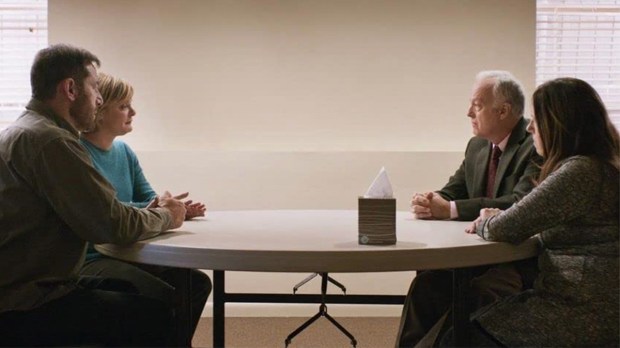It starts with preparation. A social worker and a parish employee discuss how best to set up a room in the basement of a small Episcopal church for a meeting which is about to occur. Should there be snacks? Perhaps not, as that might suggest this is to be a cordial social gathering. Should there be a box of tissue on the table? No, that might imply there are certain expected emotional outcomes. There doesn’t really seem to be any proper way to set the stage for what is about to occur.
It is with this feeling of discomfort that the new film Mass begins, and over the course of its 110 minutes, that feeling will only intensify, sometimes to levels that will test the endurance of its audience. That’s because said meeting is between two couples, one whose son died during a mass shooting at a high school, the other whose son committed the act and then took his own life. Both couples have suffered through the event and the inevitable media frenzy surrounding it, but they’ve never met face to face. Not until now.
Once the room is ready and the couples arrive, the movie essentially becomes a one-act play with four people at its center. For most of the film’s running time, the camera never strays from the small space, locking the audience inside with the grieving parents as they confront one another. It is purposely claustrophobic, allowing no respite from the intimate and often heated discourses which follow. There is to be no relief for anyone until some form of resolution is reached, if such a thing is even possible.
Given the hyper-politicized environment which often surrounds tragedies such as the one which is the impetus for the movie’s storyline, it would be easy for Mass to veer into those types of discussions. Amazingly though, first time screenwriter and feature director Fran Kranz avoids almost all mention of political issues. Instead, the focus remains on what each of the individuals needs from the gathering to help find some way to reach closure.
As such, the movie’s success or failure lies mostly on the shoulders of the four actors portraying the two couples, and they do not disappoint. There’s truly not enough good that can be said about the acting on display here. Reed Birney and Ann Dowd as the perpetrator’s parents and Martha Plimpton and Jason Isaacs as the victim’s bring everything they have to their roles, laying bare all the pain and raw emotion one would expect from such a confrontation.
And there is a lot of pain. As the conversations move from the tentative to the intense, difficult questions are raised. How much responsibility lies with the killer’s parents, and do they truly comprehend the loss resulting from their son’s actions? Conversely, is it possible the shooter could also be a victim, and if so, shouldn’t it be acknowledged that his parents have suffered a loss as well? And perhaps most important, when all is said and done, is there any place for mercy and forgiveness given the ongoing pain felt by all in the room?
A lesser movie might wrap these questions up with a neat sentimental conclusion in which all is forgiven; however, Mass doesn’t provide such an easy way out. Human emotions can be a messy thing after all, and some situations deny such a tidy outcome. There is indeed forgiveness desired inside the room, and forgiveness is offered by some, but there is also forgiveness withheld and the feeling by some that forgiveness is not yet deserved.
Grief, it seems, is a uniquely individual experience, and there is no set timetable for it to come to an end. As C.S. Lewis wrote following the death of his wife, “How often — will it be for always? — how often will the vast emptiness astonish me like a complete novelty and make me say, ‘I never realized my loss till this moment’? … I thought I could describe a state; make a map of sorrow. Sorrow, however, turns out to be not a state but a process.”
Mass is about that process, not its conclusion. It begins in a basement, literally at the bottom. But after two grueling hours, the doors are opened, light can be seen, and the sound of hymns being sung can be heard from above. Mass may offer no easy ending, neither for its characters nor its audience, but it does offer hope. As the couples go their own way, the film leaves one with a lingering sense that the process of grief, as painful as it might be, can ultimately lead to a greater compassion and empathy for the suffering of others, perhaps even for those who caused our own. And for that, as hard a watch as the movie is at times, the journey is worth it.

